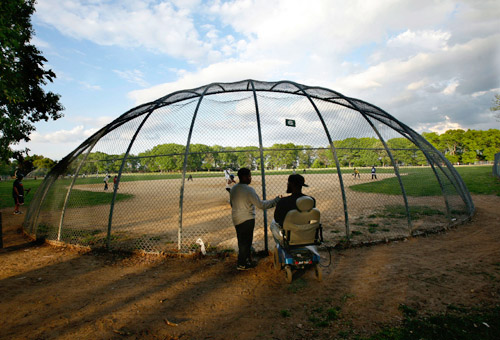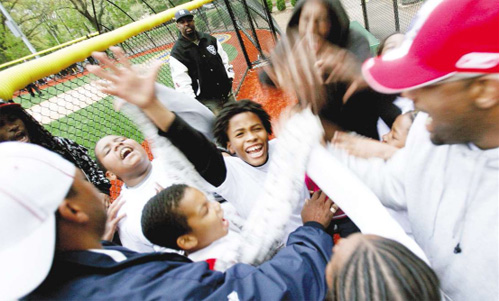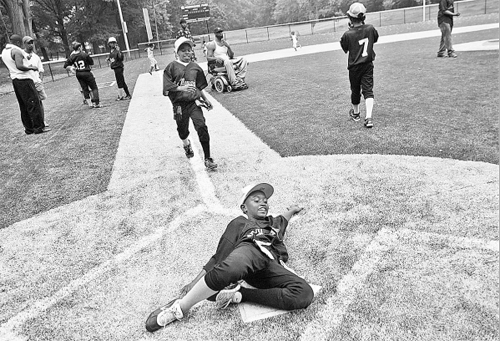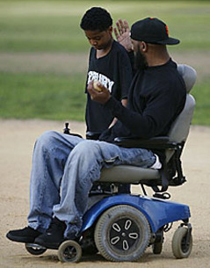A paralyzed ex-convict brought together a bunch of kids this spring from Newark’s South Ward to play Little League baseball and now…
They’re walking tall
The Star Ledger, June 29th, 2008

The field, if you could call it that, was a patch of balding grass and lumpy dirt where kids played pickup baseball in a neglected corner of Newark’s South Ward.
Little League didn’t exist there. It was an afterthought, wedged between basketball and football seasons.
Then, last winter, county construction crews tore up the bumpy old field on Elizabeth Avenue and rolled out a carpet of emerald turf. They erected a scoreboard, lights, bleachers.
When the weather broke, dozens of boys and girls between the ages of 8 and 12 flocked to the field to try out for a new Little League team that would represent the neighborhood.
The kids from Elizabeth Avenue had never played organized baseball. Some had never worn a mitt. Several couldn’t afford the $25 registration fee. They had no uniforms. They used hand-me-down equipment. Their coach was a paraplegic ex-con.
They were surrounded by poverty, drug addiction and violence. But this new field was where, for a couple hours a day, they could learn to play.
It wouldn’t be pretty. There would be fists and tears, lopsided losses and humiliating errors. Players — and an assistant coach — would threaten to quit. And their season would end with funerals for parents of two of the kids.
But there also would be moments of pure joy: Little League Baseball stripped to its essence by a bunch of ragtag kids and their underdog coach.
Their two-month journey would make them a team.
Rodney Mason pulled himself into his electric wheelchair, slipped on a black hoodie and tugged a San Francisco Giants cap low over his forehead. He took a moment to settle his nerves in his tiny sixth-floor apartment above Elizabeth Avenue.
It was April 29. In a couple of hours, Mason, 41, would coach the first game of the Elizabeth Avenue Eagles’ inaugural season in the Jackie Robinson Little League. Just getting to this point was a triumph. But there was one disappointment he couldn’t shake. When his team took the field, his players would be wearing T-shirts and denim.
“This is embarrassing,” Mason grumbled. “I remember when I played Little League. When I got my uniform, I wore it to school. Sounds funny now, but I was that proud. These kids should have the same chance.”
Mason was upset, but in a life riddled with indignities, he’d weathered worse. A former standout pitcher for Shabazz High School in the 1980s, he abandoned his dream of professional ball and ran the streets, eventually serving five months in prison for dealing drugs. In 1995, he was shot by the jealous boyfriend of a woman he’d been seeing. The bullet lodged in his spine, paralyzing him from the waist down.
He spent years in near-seclusion in his apartment, depressed and scared. But he slowly emerged from his gloom and challenged himself to do some thing to help kids in his neighborhood.
Then he saw the field.
He wheeled himself into a church basement, where the league committee was holding a monthly meeting, and proposed a team made entirely of kids from the neighborhood.
“I don’t know if you can really do this,” the league’s president, Kelley Spear, told him. “You’re going to be on the field with the kids? Are you sure?”
“Yeah, I can do it,” Mason said.
Spear was torn. She knew how badly Elizabeth Avenue needed a team. There were hundreds of kids living in its high-rise apartment buildings who couldn’t make it to any Little League fields. At the same time, she was wary of wannabe coaches who talked big.
But she saw something in the eyes of this stoic, muscular man with a shaved head and beard. It was determination.
More than six months later, on April 29, Mason, his nerves now settled, motored up Elizabeth Avenue to the new field, where his team waited for him in the chilly afternoon sun.
There were about 30 kids, all clustered around Mason, tossing balls, putting each other in headlocks.
“Coach Rock, who we playin’ today?”
“Can I pitch?”
“We gettin’ uniforms?”
Mason wondered if he could really pull it off.
He had help from three volunteer coaches who saw his notice in the newspaper about the new team. They ran drills for him and carried the equipment — a few used softball bats, donated helmets and four flimsy rubber bases. But Mason heard what other adults in the neighborhood said behind his back after seeing the first few practices how sloppy and unruly the players looked, cursing at each other, chomping candy, throwing like shot-putters and swinging at pitches over their heads.
The players didn’t seem to mind. On opening day, when Spear showed up with a bag of cheap white T-shirts with iron-on numbers, they grabbed them, yanked off their own shirts and changed behind the backstop. They chanted loudly during pre-game stretches in left field, even as their opponents, the Black Sox, fanned across the infield in clean black-and-orange uniforms, devouring ground balls and firing them to first.
Just before the game started, one of the assistant coaches, Abdul Raheem Cook, showed the Eagles’ starting pitcher, Kemar Thompson, how to throw from a rubber. The lesson came a little late.
His first pitch hit the leadoff batter, who stole second on the following pitch, took third on the next, and scored on a ground ball.
The rest of the game went pretty much the same way. The Black Sox scored most of their runs on passed balls and , while the Eagles pouted over bobbled grounders and strikeouts. They lost, 12-2.
Mason stopped two or three kids from crying. He was embarrassed, too. But he swallowed it and told the kids they needed more practice.
Later, he’d recall thinking to himself, Please, God, I hope I can do this.

EMOTIONS
On a warm Sunday afternoon on May 4, during their third game against the Philly Stars, the Eagles’ 10-year-old captain threatened to beat up one of the assistant coaches.
The boy, William “Pooh” Jones, was pitching. He lost his control, then his cool, and got tagged by Stars batters.
An assistant coach, Jamaal Calloway, walked to the mound to pull him. Will, the team’s most emotional and outspoken player, curled his hand into a fist and said, “You wanna fight?”
Other coaches rushed to intervene, while the umpire and the Philly Stars watched. Calloway, an intense Newark native who lived in suburban Roselle Park, wanted to bench Will. But Mason worried what would happen to the boy if he was removed from the game.
“If you don’t take him out, I quit,” Calloway said. When Mason told Will to catch, Calloway stormed off the field.
Mason could feel his new team falling apart. A couple of innings earlier, a promising second baseman named Delonte Livingston struck out and slouched on the bench in tears, saying he didn’t want to play anymore. Calloway pulled him from the game.
Calloway, accustomed to coaching well-organized suburban teams, wanted discipline. But others, Mason included, worried his hard-nosed style would turn the kids off.
“These kids need discipline, but we can only discipline them so much,” Mason said.
As ballplayers, they had a long way to go. They ran circles under pop-ups, and jabbed at fly balls as they sailed overhead. Some couldn’t complete a lap around the outfield without getting winded.
Kaneisha Robinson, one of two girls on the team, put her batting helmet on backward when she stepped to the plate for the first time. An 8-year-old boy, hardly taller than 3 feet, got reprimanded for sucking his fingers at second. The shortstop forced a halt to one game when he ran off the field to pee.
Mubarrak Chase, a quiet boy with bushy hair who bugged his parents to let him play, got his first hit, and when the first base coach tried to wave him to second and stretch his hit into a double, the boy froze.
“Now?” Mubarrak asked.
“Yes, now!”
When the kids made , they hollered at each other, threw their gloves in the dirt and lost their concentration. Which led to more.
Mason felt responsible for every opposing run that crossed the plate.
“We just need some pitching and practicing,” he told the kids after one loss. “I fault myself for that.”
What kept Mason motivated was the kids’ enthusiasm. Every day they showed up at the field at 5:30 p.m. and waited for his instructions. Any routine accomplishment — throwing someone out, a base hit, a run scored — was reason to celebrate. They mobbed each other in the dugout, dancing and rolling on the ground.
Other neighborhood children stopped Mason on the street, wondering if they could sign up. He never said no. He’d already let so many kids onto the team that the league had to create a second team — the Black Yankees — to accommodate them all. That’s also where Mason sent Delonte, the boy who wanted to quit; he thrived in the new environment.
“How can you tell a kid he can’t play?” Mason explained. “What if he’s shot and killed the next day hanging out on the street? I can’t deal with that.”
A few days earlier, on May 2, in their second game, the Eagles got a boost with a win against the Black Crackers, another new team. The runs came cheap — on walks, weak hits and passed balls, mostly — but it was still a victory. The finishing touch came from pitcher Kemar’s diminutive younger brother, Versace Graham, who ran onto the field and did a series of backflips.
But now, in the middle of their third game against the Philly Stars, Mason’s top coach was walking away.
Darnell Chase, a Pop Warner football coach and the father of Mubarrak, the boy with base running difficulties, stopped Calloway just outside the dugout after the dust-up with the wild pitcher.
“These are some hard kids, but we’re trying to show them better,” Chase told him. “You can’t give up on them. They’re used to people giving up on them.”
Between innings, Chase explained further: “Coaches are like the last line of defense, along with parents and teachers. For some of the kids, this is it, this is the only thing they got.”
Calloway would stick around until the last out. But he would not return.
Mason, back in the dugout, turned back to watch the game. Later, he admitted thinking, I’m trying to teach these children how to play, and I have to worry about these grown-assed men.
The Eagles lost to the Stars, 13-4. Afterward, Mason gathered them in a circle on the pitcher’s mound. “We’ll be alright, y’all. We need to have fun.”
Then, on his count of three, they all shouted, “Eagles!”

A FATHER FIGURE
DeWan Johnson — “Puda” to his teammates — crouched into a batter’s stance at Modell’s Sporting Goods in downtown Newark. On his hands was a bright white pair of batting gloves. Facing a mirror, the 11-year-old boy took an imaginary swing and beamed a gap-toothed smile.
At the counter, Mason was paying for the gloves and the boy’s first new mitt.
Until this moment, no man had ever done much to help DeWan play ball. His father was never part of his life. His stepfather was in prison. He learned to throw by watching kids on the playground, and learned to swing by watching the Yankees on TV.

DeWan had a strong arm and could field grounders, so Mason put him at third base. But the boy struggled at the plate. He struck out a lot, yet always jogged back to the dugout smiling.
When DeWan joined the Eagles, his uncle handed him an old mitt. But its holes and tears made him the butt of jokes. He told Mason, who agreed to buy him a new one. On Memorial Day, they caught the bus from Weequahic Park.
The trip made a lasting impression on DeWan. He saw the NJ Transit driver lower a platform to accommodate Mason’s wheelchair, and watched as two young men refused to give up their seats in the handicapped section of the bus.
“My coach wasted his whole spare time getting this for me, and I thank him for it,” DeWan said later.
Mason bought the gloves with money left over from a $1,100 donation made by a woman working on a documentary film about Newark violence. He’d already bought the team bats, a pitching target, a new set of catcher’s gear and a season’s worth of water and Gatorade.
Leaving Modell’s, Mason told DeWan to break in his glove by sticking it under his bed at night.
“Like, under my pillow?” DeWan asked.
“Under your mattress,” Mason said.
After he got home, DeWan told his mother how much he looked up to Mason.
“Puda said, ‘Mom, he’s like a real role model,’“ DeWan’s mother, Joey Welch, recalled. “I was like, ‘Yes. He is.’“
She added, “It doesn’t matter he’s in a wheelchair. He’s doing so much more than some people who walk.”
The team was looking better now. On May 15, after a three-game losing streak, Mason imposed a new rule: “No more arguing.”
He and the other coaches reminded them every game. And Mason believed it was working. The Eagles won their next two games.
Will, the player who threatened a coach, contained his emotions better and settled in as the team’s primary catcher. In one game, he threw a runner out at second and hit a ball to the outfield warning track.
Versace, the acrobatic infielder, stopped pouting when he struck out.
Kaneisha, who started the season unable to put her helmet on right, got her first hit — and in the excitement carried the bat to first base.
The team’s other girl, Hassanah Boykins, caught some liners in left field and hit the ball harder than some of the boys.
DeWan, playing shortstop with his new glove, executed a perfect relay from left field and threw out a runner at third.
Mason also was making them more aggressive base runners to take advantage of catchers’ young arms. “I don’t know if you noticed but there aren’t any Thurman Munsons back there,” he said. “So I’m running them raggedy.”
Better yet, the players finally got their uniforms: yellow hats, yellow socks, and black shirts that said “EA Newark” in large yellow type, and “Eagles” below. They changed into the new clothes minutes before a game against the Black Sox on May 17 and sprinted onto the field together.
“Look like a team, feel like a team,” one parent shouted.
The bleachers got more crowded, with several generations of players’ families.
Some were young fathers who talked about their own fathers never coming to see them play. One of them, Thaiquan Scott, had two kids on the team: Kaneisha, the girl who ran with the bat, and Nasir Scott, a beanpole center fielder. Their family often took up half the bleachers, sharing snacks with the others.
Mubarrak’s mother, who earlier in the season had wanted her son moved to another team, started coming to games with an air horn, which she blew after big plays. Kemar and Versace’s mother led everyone in a new cheer:
“Everywhere we go. People want to know. Who we are. So we tell them. This is EA! Mighty mighty EA! Strike ’em out EA!”
Irene McKoy, whose grandson, Derek Fykes, played infield, said Mason’s commitment to the kids made her forgive the disorganization. When other teams tried to poach Derek from the Eagles, she fended them off.
“He was the only one willing to take kids who didn’t know anything about baseball,” she said. “I respect that.”
Mason said it took time to learn how to handle the frustrated kids, the angry parents and his own insecurities.
“Things are getting good,” Mason said after a 16-2 win over the Black Crackers. “We’re past all that negative stuff.”
THE RAW CUT
In many towns and cities, baseball can be an escape, a way for kids to lose themselves in a game. But that wasn’t the case for the Eagles.
No matter what happened on the field, this was still the South Ward of Newark.
Mason knew that as well as anyone. He liked to describe his team’s gritty journey as “the raw cut,” an unblushing inner-city adventure into the American pastime.
But the season’s last few days would be the toughest.
The Eagles had been gearing up for a final-game grudge match on June 14 against the Black Yankees, the Elizabeth Avenue splinter team that, weeks earlier, had edged them, 4-3. On the night before the game, Mason gathered the players at the field and told them that Mubarrak would not be playing.
Mason had fretted over how much he should tell the kids. They hadn’t taught this one in the training class for coaches.
If he explained too much, the kids may be too shaken to play. Many of them had grown accustomed to violence in their neighborhood, and he didn’t want to make it any worse. So he decided not to tell them what happened.
Earlier that day, Friday the 13th, Mubarrak’s father, Pop Warner coach Darnell Chase, had been stabbed to death at home, his wife and children nearby. The killer had not been caught.
Mason left the kids’ questions unanswered, figuring that word would eventually get around, later. With the season about to end, he wanted them to focus on the team, and on avenging their earlier loss to the Black Yankees.
“I need this one,” Mason told them. “Real bad.”
The Eagles heard his plea and beat the Black Yankees, 9-4. DeWan enjoyed a personal victory, ending his hitting struggles with a line-drive single down the right field line. Back in the dugout, Kemar, the pitcher, put his arm around DeWan and said, “You did it!”
DeWan boasted, “Yo, next year, we’re going to be undefeated. How much you wanna bet?”
When the game ended, the Eagles lingered on the field, soaking in the win. They ran around the bases and slid into home. Versace did another flip.
Mason headed back to the dugout. “They’re looking good,” he said. “Remember how they looked in the beginning? I did a good job, right?”
He had told the kids there would still be more baseball because the Jackie Robinson Little League allowed all teams to make the playoffs.
But after the game, Spear told him that the league couldn’t come up with the $600 to pay its umpires. The playoffs would be postponed until it found the money.
In an era of richly endowed youth leagues and eight-figure professional salaries, the Jackie Robinson Little League couldn’t afford a few hundred bucks to pay someone to call balls and strikes.
To Mason, it was another painful indignity. He couldn’t bear the Eagles breaking up, even temporarily.
“Man, I’m sad as a puppy,” he said. “I’ve gotten attached to these kids.”
The disappointment was still nagging Mason later that night, when he received a tearful phone call from Irene McKoy, whose grandson Derek had nearly been poached by rival coaches.
Derek’s ill mother had just died. McKoy worried how the boy, who already had trouble controlling his anger, would handle such a crushing loss.
Derek needed the baseball team. He also needed more men like Mason. McKoy asked Mason if he’d help mentor the boy.
Mason agreed. Maybe he was doing a good job.
“He was wonderful,” McKoy said later, explaining her request. “He took the kids off the streets, some kids who had never played baseball before. But the season wasn’t long enough for Derek.”
A week passed. Mason visited the field almost every day, watching the league’s all-star tryouts and trying to keep track of his players. Finally, Spear called to say the league had come up with the money. The Eagles would play their first playoff game on Friday, June 27.
It would be a final showdown — against the Black Yankees.
But even that would end in disappointment.
The Eagles showed up eager to play. But there were only seven Black Yankees, not enough to field a team, and, even worse, none of their coaches showed up.
Mason and his squad waited around for 45 minutes until the umpire called a forfeit and awarded the game to the Eagles.
Although it was a win, the Eagles walked around looking dejected.
Then Mason reminded them that they were still in the playoffs. The more they won, the more games there would be.
“They know there’s more baseball left,” Mason said. “That’s what matters. The field would still be there.”
